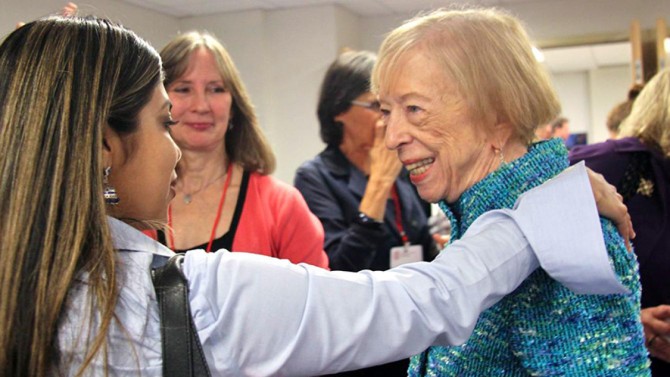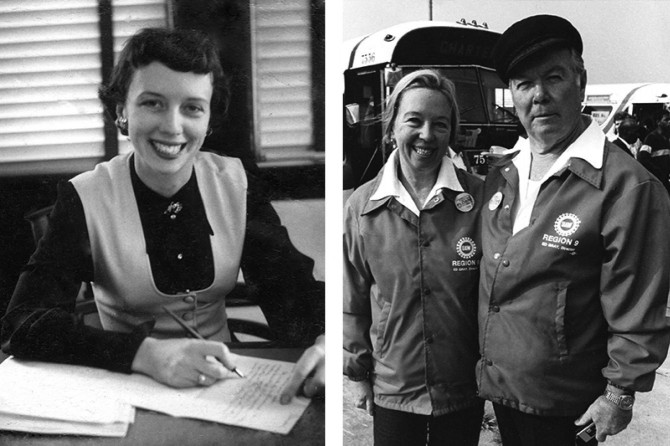
Lois Gray
Lois Gray, ‘amazing force’ at ILR School, dies at 94
By Mary Catt
Lois Spier Gray, an iconic ILR School of Industrial and Labor Relations faculty member who committed her life to advancing social justice and workers’ rights, died Sept. 20 in New York City. She was 94.
“Lois Gray was a giant, an amazing force and leader who never stopped leading during her 72 years with the ILR School. Her passion for building ILR’s teaching, research and service and her commitment to workplace fairness never waned. Lois was an inspiring mentor and adviser to so many of us,” said Kevin F. Hallock, the Kenneth F. Kahn ’69 Dean of the ILR School and the Joseph R. Rich ’80 Professor of Economics and Human Resource Studies.
Until her death, Gray continued to go to ILR’s Manhattan office several days a week to meet with ILR faculty, students, staff and union leaders to discuss research concerning critical issues of the day. Her own research on arts and entertainment had an important impact on the industry. Gray’s teaching and mentoring of labor union women over seven decades helped thousands become effective leaders in their organizations.
“Her work, her spirit and her ability to keep working, no matter what, is so inspiring,” said Professor Ileen DeVault, academic director of The Worker Institute, to which Gray committed $1 million for research collaborations that benefit workers.
Gray joined ILR in 1946, a year after ILR’s founding, to lead its Buffalo, New York, office, and in 1976 became associate dean of ILR Extension statewide. “Lois blazed the trail for the university to venture into the tumultuous real world of industrial and labor relations. She made education a tool for improving the workplace and advancing a democratic economy through collective bargaining and fair collaboration,” said Lou Jean Fleron, director of ILR Cornell Buffalo Co-Lab.
After becoming director of Cornell ILR in New York City in 1956, Gray earned a Ph.D. in economics from Columbia University, under the tutelage of Nobel Prize-winning economist Gary Becker. She was later named the Jean McKelvey-Alice Grant Chair in Labor Management Relations.
Rose Batt, ILR’s Alice Hanson Cook Professor of Women and Work, said: “Lois has been a tireless fighter for social justice and the rights of workers all of her life. She particularly focused on improving the lives of women and people of color.”
During Gray’s tenure leading ILR Extension, ILR created the Institute for Women and Work, the Latino Leadership Center, international worker exchange programs, off-campus credit and certificate courses for workers and union leaders, and other programs.
“Lois Gray’s unwavering commitment to labor education and leadership development of rank-and-file workers, and of immigrant workers in particular, has been an inspiration and a reaffirmation of the importance of this work,” said Maria Figueroa, policy research director at The Worker Institute. “Lois firmly believed that empowering workers with knowledge and critical thinking was the way to more effective and democratic labor institutions, and to a more just and inclusive society.”
Said KC Wagner, director of ILR Workplace Issues: “Lois was a brave and brilliant trailblazer.” Gray was dedicated to the United Association for Labor Education Northeast Regional Summer School for Women in Unions and Worker Organizations, founded by Barbara Wertheimer. Wagner described the summer schools as “a place where thousands of union women join together to lift up their voices in skill building, empowerment and networking.”
Wagner continued: “Lois was gracious and generous with her time and knowledge. She would gather with students at summer school in the dining hall, or grab a cup of coffee during breaks or sit with students into the night at a picnic table after an evening event, as they regaled each other with stories of strategies and successes in breaking barriers as women leaders and organizing – whether that be as a rank-and-file member or elected officer,” Wagner said. “We owe her a great debt of gratitude for her inspiration, wise mentoring and for being a model that inspired us all to keep moving forward for women workers everywhere.”
Gray, the daughter of a Presbyterian minister, grew up in Edmond, Oklahoma. Her father spoke from the pulpit about racial injustice. Gray saw the Ku Klux Klan burn a cross on the lawn of the parsonage where her family lived, said Bonnie Beavers, her niece.
Gray earned a scholarship to Northwestern University, where she was a drama major. When her father enlisted for World War II service, she and her mother and sister, Jeanette, relocated, and Gray transferred to a work-study program at Park College in Missouri
After a stint in St. Louis as a credit manager for a publishing company and as a night school student at Washington University, she was recruited into secret military intelligence work at the Pentagon in a unit that became part of the CIA. After her World War II service, she pursued her interest in unions and work with the National Labor Relations Board in Buffalo in 1945. A year later, Gray was hired by ILR, which she helped shape as it grew from a school with few students to one that enrolls about 1,200 students. Its statewide and online programs reach thousands. In several places in this video, Gray speaks to the school’s history.
Gray taught courses in labor economics, collective bargaining, and labor union structure and government. Her research focused on labor market trends, women and minorities, training and adult education, labor management relations, labor union effectiveness and labor in the arts and entertainment industry – a subject Gray was researching as recently as a few weeks ago.
In 1970, Gray began, with Professors Jean McKelvey and Alice Grant, the state’s first training program for women arbitrators. Three New York state governors appointed her chair of the New York State Apprenticeship and Training Council. Gray was honored by the New York Hispanic Labor Committee, the New York State Labor History Association, the New York Committee for Occupational Safety and Health, the New York State AFL-CIO and the Labor and Employment Relations Association.
In honor of her late husband, Gray funded the Edward Gray Memorial Credit Internship Awards for students considering careers in labor and social justice. She supervised ILR’s Harry Van Arsdale Jr. Fellowship program in New York City, mentoring students through their educations and careers.
In 2010, in honor of Gray’s lifetime impact on ILR, the school established the Lois Gray Professorship of Industrial Relations and Social Science.
Annually, in honor of two of its most revered faculty members, ILR holds the Alice Hanson Cook and Lois Gray Distinguished Lecture to recognize scholars whose research and advocacy advance the legacy of Cook’s and Gray’s commitment to equality and workplace justice.
“Lois was the strongest woman I ever met. She was my friend, my mentor and a leader,” said Esta Bigler ’70, director of ILR’s Labor and Employment Law Programs. “She was totally dedicated to working people.”
Gray helped carry out ILR’s mission through its entire history and will continue to influence the school, Bigler said. “May her memory be a blessing as we carry on her work.”
Gray is survived by her sister’s children and grandchildren and her husband’s extended family.
Mary Catt is assistant director of communications at the ILR School.
Editor's note: This story was updated on Nov. 26, 2018.
Media Contact
Get Cornell news delivered right to your inbox.
Subscribe


